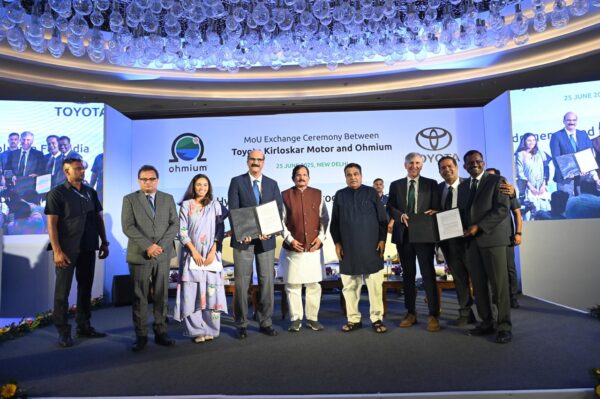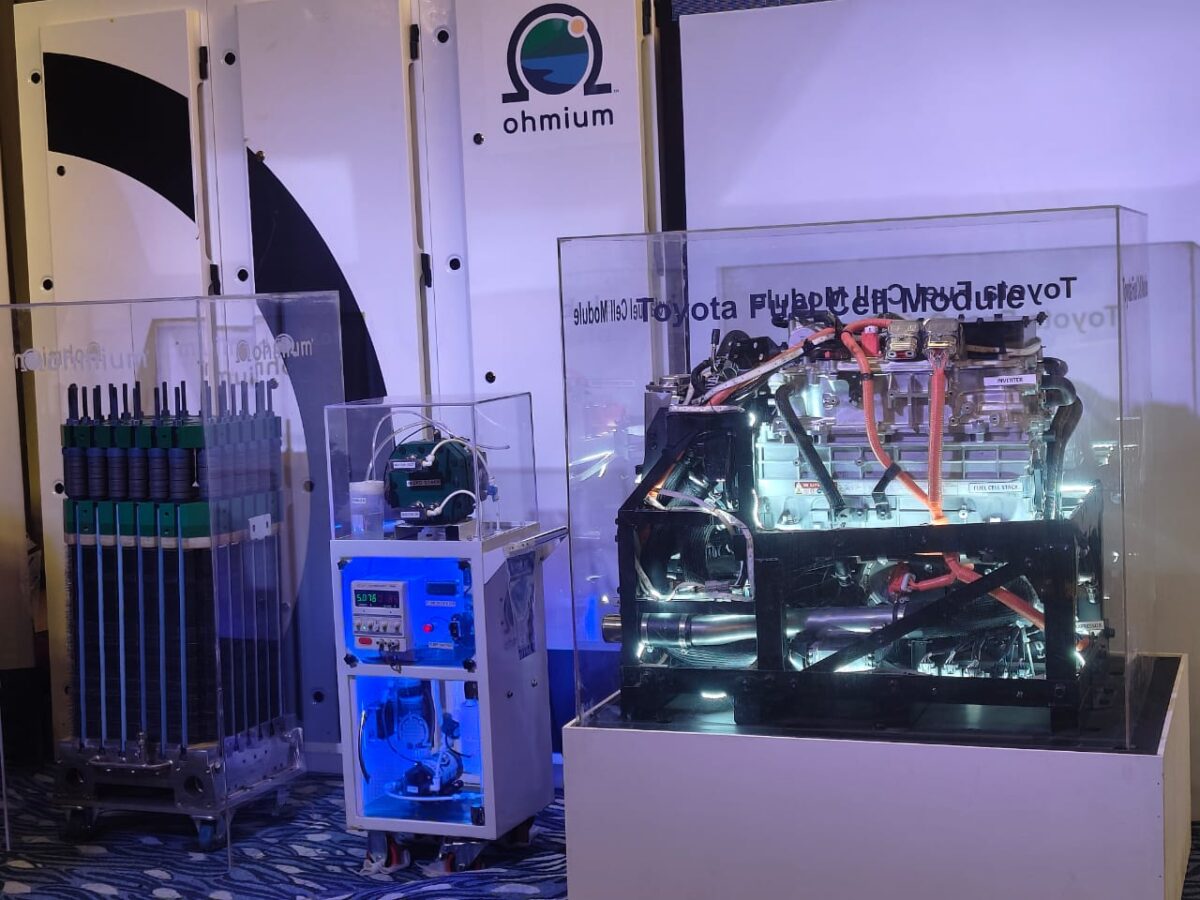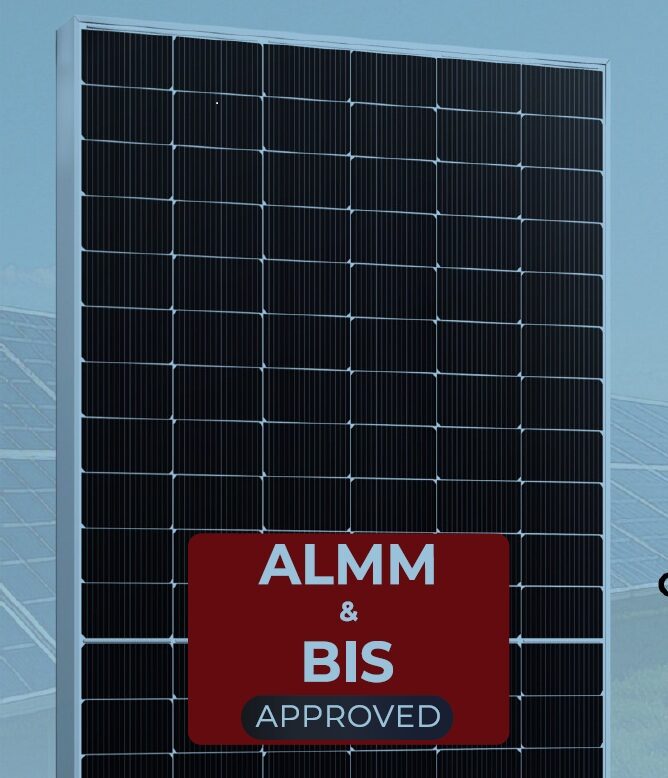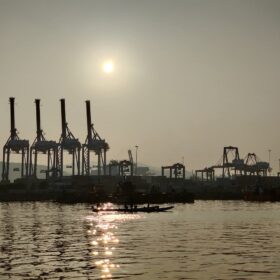Toyota Kirloskar Motor and Ohmium International have signed a Memorandum of Understanding (MoU) to jointly develop green hydrogen-based microgrid solutions in India.
The partnership will explore scalable and cost-effective hydrogen microgrid solutions by combining Toyota’s expertise in Proton Exchange Membrane (PEM) fuel cell technology with Ohmium’s modular and high-efficiency PEM electrolyzer systems.
Hydrogen microgrid applications range from remote locations to urban commercial spaces to data centers. The scope of Toyota Kirloskar-Ohmium partnership covers design and planning, prototype development and testing, and techno-economic feasibility.
The announcement event was graced by union minister Nitin Gadkari (Road Transport and Highways), Shripad Yesso Naik (Minister of State for New & Renewable Energy), and Manjinder Singh Sirsa (Minister, Environment and Industries, Govt. of NCT of Delhi). Toyota Kirloskar’s vice chairperson Manasi Tata Kirloskar and deputy managing director Swapnesh R. Maru also addressed the gathering.

Ohmium’s factory-assembled PEM modules are designed for rapid deployment and include advanced power electronics and closed-loop cooling systems
The partnership aims to enhance the efficiency, scalability, and affordability of green hydrogen-based energy solutions.
“By combining Toyota’s globally renowned expertise in fuel cell systems and Ohmium’s cutting-edge PEM hydrogen technology, we aim to deliver scalable, efficient and affordable solutions that accelerate India’s journey toward a carbon-neutral future,” said Sudeep Dalvi, Chief Communication Officer, Senior Vice President and Head of State Affairs, Toyota Kirloskar Motor.
“Toyota is known worldwide for their commitment and leadership in fuel cell and hydrogen technology. At Ohmium, we are very excited by the opportunity to work together on our joint mission of making green hydrogen-powered machines practical in the near and immediate term,” said Arne Ballantine, CEO of Ohmium.
Ohmium designs, manufactures, and deploys modular, scalable PEM electrolyzers that enable cost-competitive green hydrogen production. Headquartered in the United States with manufacturing facilities in India and operations worldwide, Ohmium has a global green hydrogen project pipeline exceeding 2 GW across three continents. In 2023, Ohmium raised $250 Million in Series C financing, led by TPG Rise Climate.
FAW Hongqi said its hydrogen fuel cell vehicle program has passed hydrogen consumption and driving range tests. “According to the test results, Red Flag’s hydrogen fuel cell system passed the test with excellent performance in dimensions such as stability and energy management precision, and achieved a 15% reduction in hydrogen consumption compared with competitors with smaller overall mass, reaching the industry’s leading level,” said SASAC. The authorities said the test improves the program’s outlook, signaling faster industrialization and mass production of hydrogen fuel cell vehicles. “In the next step, FAW will continue to optimize the performance and quality of Hongqi hydrogen fuel cell vehicles, further consolidate its leading position in this strategic technology field, and inject innovative power for the high-quality development of China’s new energy automobile industry.”
ArcelorMittal said it sees green hydrogen as currently unviable and natural gas-based direct reduced iron (DRI) production as noncompetitive as a transitional solution. “As the contract with the German government for the €1.3 billion funding provided for construction work on the project to begin by June 2025, ArcelorMittal was obliged to officially inform the government that it would not be able to continue with the investment due to the market situation and the lack of economic viability of CO₂-reduced steel production,” the said the company . Referring to its projects in Bremen and Eisenhüttenstadt, ArcelorMittal added that the energy transition is progressing more slowly than expected in all areas.
Storengy Deutschland said it will secure up to €4.5 million in funding from the European Union’s Connecting Europe Facility (CEF) fund. The funds will be used to conduct studies for the further development of the SaltHy hydrogen project, the company said after signing the grant agreement with the European Commission this week.
Eurogas said a dozen European organizations raised concerns over the draft Delegated Regulation on Low Carbon Fuels, which could become law as early as August 2025. “Eurogas and 16 co-signatories including Ammonia Europe, Fertilizers Europe, IFIEC and CCSA are urging the European Commission to revise the methodology for assessing whether a fuel qualifies as low-carbon and enabling producers to demonstrate better performance on emissions,” the association said. It added that the draft secondary legislation “would make low carbon hydrogen production in the EU nearly impossible by imposing restrictive and unworkable emission calculation rules.”
The Tokyo Metropolitan Government has announced the results of its green hydrogen trading pilot launched in mid-June, where selling and purchasing prices are set via bidding. If a supplier’s bid exceeds a user’s bid, the Tokyo Metropolitan Government covers the difference. The government conducted bidding for trailer and cardle transport. The winning bid for trailer transport was JPY 280 ($1.93) per Normal Lube, while cardle transport cleared at JPY 355 per Normal Lube, according to the government’s website. On the demand side, two bidders offered ¥100 per Normal Lube for trailer transport and three bidders offered JPY 280 per Normal Lube for cardle transport. Trailer deliveries will occur twice weekly from July to September 2025; cardle transport will include six total shipments in that period. The government did not respond to questions regarding bidding categories, transportation methods, prices, or lubes.
This content is protected by copyright and may not be reused. If you want to cooperate with us and would like to reuse some of our content, please contact: editors@pv-magazine.com.









By submitting this form you agree to pv magazine using your data for the purposes of publishing your comment.
Your personal data will only be disclosed or otherwise transmitted to third parties for the purposes of spam filtering or if this is necessary for technical maintenance of the website. Any other transfer to third parties will not take place unless this is justified on the basis of applicable data protection regulations or if pv magazine is legally obliged to do so.
You may revoke this consent at any time with effect for the future, in which case your personal data will be deleted immediately. Otherwise, your data will be deleted if pv magazine has processed your request or the purpose of data storage is fulfilled.
Further information on data privacy can be found in our Data Protection Policy.